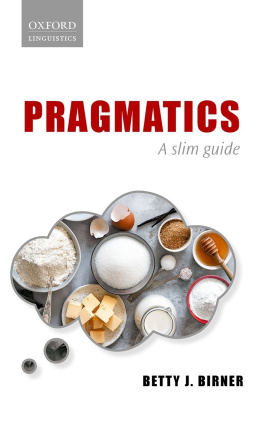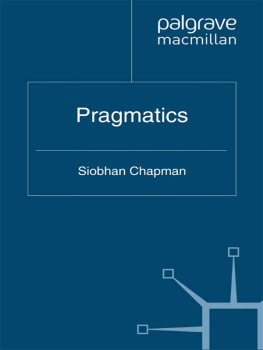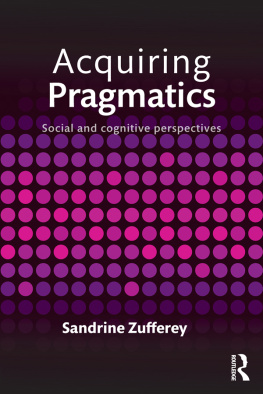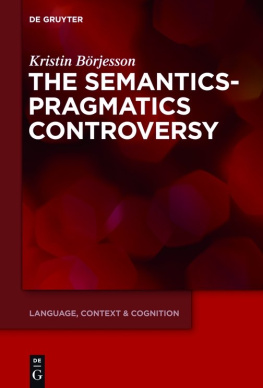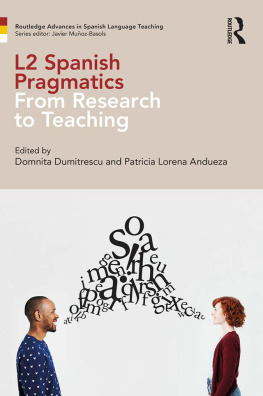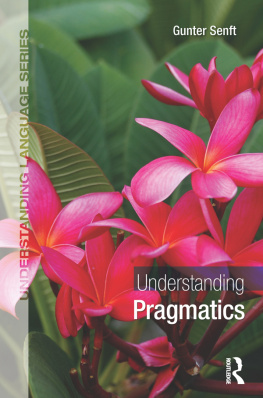DOING PRAGMATICS
THIRD EDITION
DOING PRAGMATICS
PETER GRUNDY

First edition published in Great Britain in 1995
Second edition published in 2000
This third edition published in 2008
By Hodder Education
Published 2013 by Routledge
2 Park Square, Milton Park, Abingdon, Oxon OX14 4RN
711 Third Avenue, New York, NY, 10017, USA
Routledge is an imprint of the Taylor & Francis Group, an informa business
Copyright 2008 Peter Grundy
All rights reserved. No part of this book may be reprinted or reproduced or utilised in any form or by any electronic, mechanical, or other means, now known or hereafter invented, including photocopying and recording, or in any information storage or retrieval system, without permission in writing from the publishers.
The advice and information in this book are believed to be true and accurate at the date of going to press, but neither the authors nor the publisher can accept any legal responsibility or liability for any errors or omissions.
British Library Cataloguing in Publication Data
A catalogue record for this title is available from the British Library
Library of Congress Cataloging-in-Publication Data
A catalog record for this book is available from the Library of Congress
ISBN 13: 978-0-340-97160-4 (pbk)
Contents
Some students find that learning pragmatics and learning syntax are mirror images of one another. Because pragmatic data consist of everyday utterances, the first impression of pragmatics tends to be that its really quite easy: the examples and the ways they are described seem to accord closely with our intuitions about everyday talk. In contrast, when we study syntax for the first time, the formal representation of the examples often seems very challenging. But as time goes on, we realize that the underlying ideas in pragmatics are really very difficult indeed, whereas the underlying ideas in syntax have a simplicity and elegance that make syntax seem less difficult the more we study it. My main motive in writing this book has been to try and extend the sense felt in the early stages of pragmatics, that its really a very accessible area of linguistics, to the second stage when we have to grapple with the more challenging underlying ideas.
There are now several very good pragmatics textbooks available: for this reason Ive recommended chapters from several of them in the suggestions for further reading which appear at the end of each chapter. If this book is different, I hope its because youll feel that its a genuine entry-level book with a wide coverage and with a suitable degree of challenge too. I also hope it justifies its title, Doing Pragmatics, which is meant to reflect its strong pedagogic orientation. Wherever possible, Ive tried to use real examples of talk that Ive collected over the years rather than rely on invented examples. A book about the use of language ought to work with live examples.
The materials in this book have been extensively trialled over several generations of students. Ive been fortunate to have had the opportunity to teach pragmatics at undergraduate and postgraduate levels for many years and to have benefited from large and extremely lively lecture and seminar groups where Ive frequently been caught out and corrected by clever students. And I have to admit that reading pragmatics essays and projects is often a learning experience too students frequently have insights and react to data in ways that Ive found enlightening and shaming.
As well as all the faults that are owed to me, in this book youll also find many insights that are owed to generations of students. In particular, Ive acknowledged some by name in the text of the book: Laurence Brushi, Andrew Caink, Roger Maylor, Csilla Szabo, and especially Kelly Glover, who contributed ideas to and read and commented insightfully on parts of the manuscript of the first edition all those years ago, thereby saving me from a number of mistakes. I also owe a considerable debt to Joanne Burdon, Charlotte Harper, Zhang Lin and Susan Millington, whove generously allowed me to use data which they collected and analysed in particularly insightful ways. Several of my former colleagues in Hong Kong have also helped, both practically with data collection as well as with their insights, especially Annie Au, Phil Benson, Philip Bolt, Winnie Cheng, Hiroko Itakura, Yan Jiang and Martin Warren. But because this is pragmatics, Im sure that as you read this book youll see things that Ive missed and even got wrong please write and let me know when this happens.
In fact, one of the real pleasures Ive enjoyed since the first edition came out in 1995 has been receiving so many thought-provoking comments from readers and users. Ive tried to act on all the helpful suggestions Ive received for this edition and gratefully acknowledge them here.
I also owe a great deal to the readers who commented anonymously on the proposals for this and previous editions. I appreciate the real trouble they took. The further refinements and new materials in this edition owe much to their helpful and generous work.
Although I never had a colleague at Durham who was first and foremost a pragmaticist, I was fortunate enough to work alongside stimulating colleagues in a department that took its linguistics seriously and in which all our different interests and approaches were understood to be independent and yet to have the same ultimate goal. As with deixis, the point of origin has been important to this book. All the more pity that in a moment of utter foolishness the powers-that-were decided to close the once outstanding Linguistics Department at Durham, a decision which so many linguists around the world have deplored.
I also owe a debt to my editors at Hodder Education, Lesley Riddle, who threw caution to the winds in allowing me to write this book in the first place, and Naomi Meredith, who bore with me when the first edition took longer than it should have done. Naomi also suggested the title, which is much better than those Id toyed with and which has often been praised by other pragmaticists. Christina Wipf-Perry, the second edition editor, shamed me into trying to match her constant efficiency and at the same time gave me real confidence. For the third edition Ive been fortunate to have Tamsin Smith and Bianca Knights to guide me and tidy up ever so many loose ends. Their kindness and attention to detail have been inspirational. Ive also been very fortunate in having had Susan Dunsmore as copy editor for both the second edition and for this edition. No one could have made a better job of turning a less than tidy manuscript into the beautiful book you hold in your hand.
How to get the best out of this book
As you work your way through Doing Pragmatics, youll notice that theres a movement from the study of short utterances in the early chapters to the study of more extended conversations in the later chapters. Its not only the data type that change, but the approach to pragmatics too. In the early chapters, youll learn about the central areas of linguistic pragmatics. You can then use this knowledge in the later chapters as you develop the ability to handle larger pieces of data in a more empirical way. Towards the end of the book, youll find yourself progressively invited to take a stance in the various debates about approaches to pragmatics. Youll also notice that examples which we work with in the earlier chapters sometimes turn up again in the later chapters. This gives you a sense of familiarity as you meet old friends again, but also shows that more than one way of accounting for a single example is often appropriate. As youll see, things arent always as simple as they appear at first sight.
Next page



